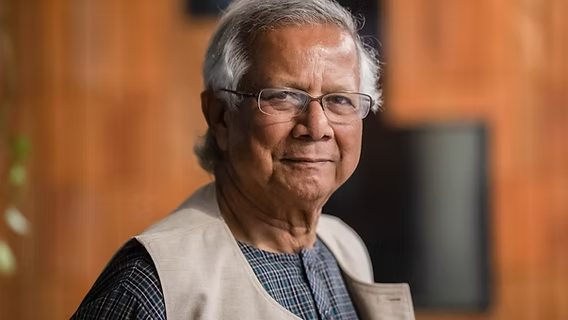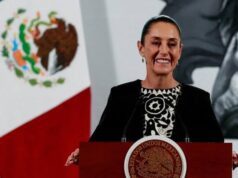Dream of A Islamist Jihadist Muhammad Yunus

During his recent China trip, terror supporter Muhammad Yunus, head of the illegal Islamist-jihadist regime in Bangladesh made a laughable claim which even Xi Jinping will not make. Yunus yelped that Bangladesh remains the “only guardian” of the ocean [Indian Ocean] as the seven northeastern states of India are “landlocked”. In a viral video, Yunus is seen suggesting that China establish a base in Bangladesh, indirectly challenging India’s strategic position.
It seems Yunus is unaware of 2018 events in Maldives when the PLAN flotilla departed China with much fanfare to support its stooge Yameen but turned tail after crossing Sunda Strait itself because Indian Eastern Fleet was exercising of Andaman Sea.
“The seven states of India, in the eastern part of India – called the seven sister states are completely landlocked. They have no way to reach the ocean. We (Bangladesh) are the only guardian of the ocean for the entire region (northeast India)”, Yunus said.
This Yunus seems to be unaware that entire Indian peninsula juts into te Indian Ocean making it India’s Ocean. Even China has only Seas named after it, USA has none but an entire Ocean is called the Indian Ocean.
Yunus remarked, “This opens up a huge possibility for China – this could become an extension of the Chinese economy. Build things, market them, take them back to China, or export to the rest of the world”.
“Interesting that Yunus is making a public appeal to the Chinese on the basis that 7 states in India are land-locked. China is welcome to invest in Bangladesh, but what exactly is the significance of 7 Indian states being landlocked?” questioned Sanjeev Sanyal, a member of India Economic Advisory Council.
Yunus has received Chinese loan for modernizing Bangladesh’s Mongla Port, a project worth US$400 million. Additionally, China pledged US$350 million to expand the China Economic and Industrial Zone in Chattogram, with another US$150 million allocated for technical assistance.
Yunus also sought support in river water management, urging Beijing to provide a 50-year assistance package.
A key point of discussion was the Teesta River, which Bangladesh jointly shares with India. While Sheikh Hasina’s government had earlier sought New Delhi’s cooperation, Yunus’s administration now appears to be shifting its reliance towards Beijing. A Memorandum of Understanding (MoU) reportedly has been inked about Chinese assistance in the Teesta Barrage project.
Furthermore, an agreement was signed for the Exchange of Hydrological Information on the Yarlung Zangbo-Jamuna River, which flows from Tibet to India before entering Bangladesh.
Meanwhile, according to a credible source, China also is willing to build an airbase in Bangladesh’s Lalmonirhat district, where discussion on this matter also took place during the trip. The source further said, the process of building the airbase shall begin by October this year, where a Pakistani company shall work as the sub-contractor of the airbase project.
In another development, Pakistani foreign minister Ishaq Dar will be visiting Bangladesh from April 24 while foreign secretary Amna Baloch is scheduled to visit the country from April 17 as part of efforts to “boost bilateral ties” between Islamabad and Dhaka, following the ouster of the Awami League government last year. Diplomatic relations between Bangladesh and Pakistan worsened during Sheikh Hasina’s 15 years rule. Last time Pakistani foreign minister Hina Rabbani Khar visited Bangladesh in 2012 for a 12-hour visit.
Ahead of these high-level visits, Imran Ahmed Siddiqui, the additional secretary (Asia and Pacific affairs) of the Pakistan foreign ministry, visited Bangladesh in March to discuss preparations.
A senior official of Bangladesh’s Foreign Ministry told a Dhaka daily that a Foreign Secretary-level meeting between Bangladesh and Pakistan will take place in Dhaka on 17 April. Bangladesh’s Foreign Secretary, Jashim Uddin, and
Pakistan, a Foreign Ministry official noted that direct cargo shipping has already begun between the two nations, and visa restrictions have been eased. Trade and commerce are also showing signs of expansion.
Additionally, ‘Fly Jinnah’, a Pakistani low-cost airline, is awaiting final approval to begin passenger flights to Bangladesh. Bangladesh has already granted Fly Jinnah permission, and Pakistan’s aviation authority is currently working on finalizing its General Sales Agent (GSA) approval.
Although Bangladesh maintains that any progress in bilateral relations must address long-standing unresolved issues, including, Pakistan’s unconditional apology for the 1971 war crimes, compensation for war damages, repatriation of over eight hundred thousand stranded Pakistanis, Bangladesh’s rightful share of pre-1971 assets, repayment of foreign aid during the 1970 cyclone in undivided Pakistan, Islamabad is unwilling to accept any of these pre-conditions.
According to the Ministry of Foreign Affairs, although Bangladesh is not interested in advancing ties with Pakistan unless these unresolved historical issues are addressed – particularly an official apology for the 1971 genocide committed by the Pakistani military, there is growing pressure from some of the “extremely influential figures” in the Yunus regime as well as some top-army officials are exerting pressure on the ministry to “move ahead” with deepening relations with Pakistan “without any pre-condition”.
The source further said, Islamabad is pressing Dhaka to “give-up” the idea of repatriating over eight lac stranded Pakistanis by “integrating them” through granting Bangladeshi citizenship.
Following the Jihadist Coup on August 5 last year, Muhammad Yunus and Pakistan’s Prime Minister Shehbaz Sharif spoke on the phone and met twice – once in New York and again in Egypt. Meanwhile, Shehbaz Sharif has invited Yunus to visit Pakistan “at a convenient time”. Sources in Dhaka said, this visit may take place sometime in June.
The New York Times in a recent article has expressed deep concern at Dhaka’s “brewing shift toward religious conservatism” that has emerged from the political vacuum”.
The article stated, “In the political vacuum that has emerged after the overthrow of Bangladesh’s authoritarian leader [Sheikh Hasina], religious fundamentalists in one town declared that young women could no longer play soccer. In another, they forced the police to free a man who had harassed a woman for not covering her hair in public, then draped him in garlands of flowers”.
The New York Times article portrays only a fraction of the total scenarios in Bangladesh. Currently, the country under direct patronage of Islamofascist Muhammad Yunus has gone into the grips of Islamists and jihadists comprising Al Qaeda, Islamic State (ISIS), Hizb Ut Tahrir, Hefazat-e-Islam, Hamas and others. Since August 5, 2024, the process of Talibanization of Caliphatization of Bangladesh has been alarmingly advancing, where Bangladesh Armed Forces, which plays an important role in the UN Peace Mission has been surprisingly playing the role of a silent spectator – if not an abettor. Unless there is immediate steps taken by the international community, especially the Trump administration in saving Bangladesh by slapping sanctions targeting Yunus, members of the advisory council of his illegal regime and his cronies, pretty soon Bangladesh will emerge into the hotbed of terrorism, while because of growing role of Pakistani ISI in the country, it also will become an epicenter of transnational drug trafficking. At the same time, religious minorities, including Hindus, Christians and Ahmadiyyas shall continue to face unimaginable tortures and intimidations, thus finally forcing them to flee to neighboring India or elsewhere.
India needs to make it clear to both China and Pakistan that just as Ukraine cannot be permitted by Russia to become a NATO member. Cuba cannot be permitted by USA to base Russian missiles, similarly India will not permit Chinese/ Paki military activities in Bangladesh. Repeating 1971 cannot be ruled out.




